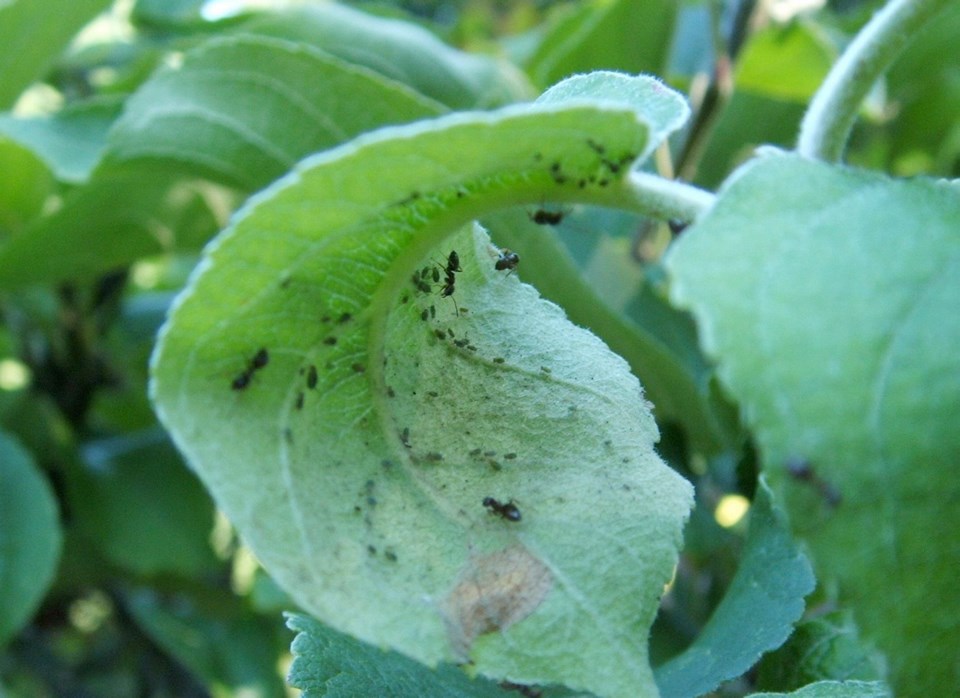Dear Helen: I’ve often had ants in rose bushes and apple trees that also have aphids feeding on the plants’ tender shoot tips. Can you explain why? Then, this summer, black ants chewed into the centres of flowerbuds on my roses, destroying the buds even though there were no aphids in the plants. Can you explain this? What do you think about scattering corn meal (attractive but indigestible to ants) at the plants’ bases or using Tanglefoot on the canes to trap ants?
E.H.
Yours is the latest in a series of questions I’ve received this summer about ants, aphids, and damaged plants.
Reliable authorities, including the Royal Horticultural Society, affirm a common and well documented ant-aphid relationship that, as local entomologist Linda Gilkeson notes, “one can see in any garden.” During my summer pruning I always find ants diverted from their progress in and out of the tree onto my arm as I cut away aphid-infested shoot tips on the apple trees.
There are ants that find other sweet things to feed on, other than the honeydew excreted by ants. Still, the ant-aphid scene is there to be observed by those of us who spend a fair amount of time tending plants.
Linda, also an instructor in the Master Gardener program, tells me she has seen numerous videos of ants protecting aphid colonies by removing or killing lady beetle larvae and even dislodging “relatively gigantic adult lady beetles by grabbing their legs and tipping them over the edge of the leaf.”
My sincere thanks to Linda for her generously detailed reply to my request for her thoughts on this issue.
Where ants are present in a plant that hosts no aphids, there are most likely other sources of sweet nectar they are after. We’ve all seen ants crawling over the fat flower buds of peonies in the spring as they feed on the buds’ sticky coatings. And, as a reader kindly pointed out recently, stems or leaves on various trees and other plants produce fluids that insects feed on.
Though it is not a common occurrence, my Royal Horticultural Society reference does note that in their search for nectar ants sometimes do damage the flower buds of fruiting and ornamental trees and shrubs. Further research indicates that some ants eat into rose buds, perhaps to wound them and cause them to exude syrup. Or, they may be attracted by sweet sap released from buds already wounded by insect pest feeding.
When ants are present in a plant going to and from aphid clusters, or ants are doing direct damage to buds, the key is to exclude ants from the plant. Tanglefoot is a thick, sticky substance that needs to be applied to plastic or tape banding on the lower stems. It is not applied directly onto the plant. This makes Tanglefoot unsuitable for rose bushes, though it would work on a tree rose (and apple trees).
Corn meal does control some insect pests through explosive indigestion; however, it can also attract rats and other undesirable rodents.
Though it needs to be used with caution because it also affects beneficial insects, diatomaceous earth (DE) applied sparingly onto the bases of the canes and on the ground around the plant will help to control ants. DE contains ground-up fossilized shells of diatoms, which have cell walls of silica. To us it appears as a fine powder, but its sharp shards cut into insects, causing them to dry up. Take care not to breathe it in.
GARDEN EVENTS
Lily meeting. The Victoria Lily Society meetS tonight at 7:30 in the Salvation Army Citadel, 4030 Douglas St. (at McKenzie). Guest speaker Bruce Richardson, lily grower and hybridizer, will present “Looking at Lillies.” Visitors are welcome.
Eaglecrest meeting. Tonight at 7 in the Qualicum Beach Civic Centre, the Eaglecrest Garden Club will welcome Brad Jalbert, owner of Select Roses, presenting “Today’s Healthy Roses grown without Toxic Chemicals.” Doors open at 6. There is a $5 entrance fee for non-members.
Chrysanthemum meeting. The Victoria Chrysanthemum Society will meet on Thursday at 7:30 p.m. in St. Matthias Church Hall, 600 Richmond Ave. The meeting will feature a parlour show.
Plant sale. The Peninsula Garden Club will host its annual Fall Plant Sale at the Mary Winspear Centre in Sidney on Saturday, 9-11 a.m. Look for a wide selection of plants at great prices.
